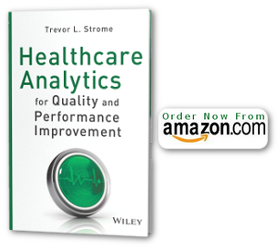What are the set of skills required for somebody to be considered a healthcare business intelligence (BI) or analytics professional?
In the BI discussion groups and blogs that I follow, there has been substantial discussion about the skillsets of BI practitioners. Some commentators argue strongly that it is the technical tools and skills that count most strongly, whereas others state just as strongly it’s more about the analytical skills and business knowledge.
In a recent blog posting, Steve Miller devised a checklist for key skills necessary for success as a BI/analytics professional. While all the skills he mentioned are important in the field of BI/analytics, here are some of the items he mentioned that I think are particularly relevant to the field of healthcare analytics (with my added comments):
- “Facility with standard statistical/BI packages to perform analytic calculations” – Many HCOs are adopting BI tools such as Cognos and Business Objects, so an understanding of basic BI toolsets is essential to function in healthcare business intelligence. (Having said that, there is some incredible work being done in MS Excel at those HCOs who have not yet adopted other BI tools.)
- “Ability to use the scientific method to conceptualize business problems” – Many HCOs are now adopting Lean, Six Sigma, and other quality improvement methodologies. What many of these methodologies have in common is the use of the scientific method to identify issues, break a problem into its component parts, and identify possible solutions.
- “Data centricity – obsession with evidence-based problem resolution” – Use of the scientific method to resolve problems requires data to both quantify an issue and evaluate process changes and outcomes. Without data, problem resolution is all guesswork based on gut feelings.
- “Understanding of the meaning of business optimization” – Many healthcare workers are threatened by process improvement initiatives because they fear “eliminating waste” (as per Lean) means making them work even harder than they already do. Part of business optimization means using data to change work to allow clinicians to focus on what they do best, and eliminating activities that take away from that work.
- “Ability to provide advice on the design of business analytic investigations” – Whether involved in strategic initiatives for HCO leadership or tactical initiatives at ground-level, healthcare BI/analytics professionals need to translate business problems (i.e., how do we optimize the flow of patients who require emergency cardiac procedures) into metrics that are relevant to the issue and available from the data at the frequency required.
There are many other fine points that Steve makes in his blog entry, however these ones stand out due to their relevance in Healthcare.
In healthcare, business intelligence professionals may find themselves working with HCO executives on strategic dashboard projects. They may also work with nursing unit managers, subject matter experts, and process improvement facilitators on tactical-level projects requiring analytics applications to improve patient flow.
Because of the different roles healthcare BI professionals may find themselves in, a strong mix of technical, inter-personal, and analytical skills is essential to successfully operate in today’s challenging healthcare environment.

{ 0 comments… add one now }